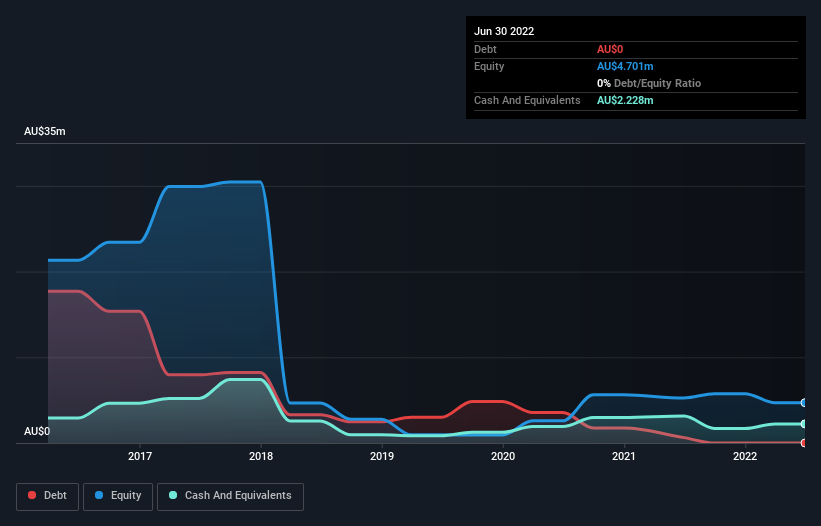
Even when a business is losing money, it's possible for shareholders to make money if they buy a good business at the right price. For example, although software-as-a-service business Salesforce.com lost money for years while it grew recurring revenue, if you held shares since 2005, you'd have done very well indeed. But while history lauds those rare successes, those that fail are often forgotten; who remembers Pets.com?
So should Unith (ASX:UNT) shareholders be worried about its cash burn? For the purpose of this article, we'll define cash burn as the amount of cash the company is spending each year to fund its growth (also called its negative free cash flow). Let's start with an examination of the business' cash, relative to its cash burn.
See our latest analysis for Unith
How Long Is Unith's Cash Runway?
You can calculate a company's cash runway by dividing the amount of cash it has by the rate at which it is spending that cash. As at June 2022, Unith had cash of AU$2.2m and no debt. Importantly, its cash burn was AU$781k over the trailing twelve months. So it had a cash runway of about 2.9 years from June 2022. Arguably, that's a prudent and sensible length of runway to have. You can see how its cash balance has changed over time in the image below.

How Well Is Unith Growing?
We reckon the fact that Unith managed to shrink its cash burn by 46% over the last year is rather encouraging. Unfortunately, however, operating revenue declined by 24% during the period. On balance, we'd say the company is improving over time. In reality, this article only makes a short study of the company's growth data. This graph of historic earnings and revenue shows how Unith is building its business over time.
How Hard Would It Be For Unith To Raise More Cash For Growth?
There's no doubt Unith seems to be in a fairly good position, when it comes to managing its cash burn, but even if it's only hypothetical, it's always worth asking how easily it could raise more money to fund growth. Companies can raise capital through either debt or equity. One of the main advantages held by publicly listed companies is that they can sell shares to investors to raise cash and fund growth. By comparing a company's annual cash burn to its total market capitalisation, we can estimate roughly how many shares it would have to issue in order to run the company for another year (at the same burn rate).
Unith has a market capitalisation of AU$29m and burnt through AU$781k last year, which is 2.7% of the company's market value. So it could almost certainly just borrow a little to fund another year's growth, or else easily raise the cash by issuing a few shares.
So, Should We Worry About Unith's Cash Burn?
It may already be apparent to you that we're relatively comfortable with the way Unith is burning through its cash. In particular, we think its cash runway stands out as evidence that the company is well on top of its spending. While its falling revenue wasn't great, the other factors mentioned in this article more than make up for weakness on that measure. Looking at all the measures in this article, together, we're not worried about its rate of cash burn, which seems to be under control. Separately, we looked at different risks affecting the company and spotted 4 warning signs for Unith (of which 1 doesn't sit too well with us!) you should know about.
Of course, you might find a fantastic investment by looking elsewhere. So take a peek at this free list of interesting companies, and this list of stocks growth stocks (according to analyst forecasts)
New: AI Stock Screener & Alerts
Our new AI Stock Screener scans the market every day to uncover opportunities.
• Dividend Powerhouses (3%+ Yield)
• Undervalued Small Caps with Insider Buying
• High growth Tech and AI Companies
Or build your own from over 50 metrics.
Have feedback on this article? Concerned about the content? Get in touch with us directly. Alternatively, email editorial-team (at) simplywallst.com.
This article by Simply Wall St is general in nature. We provide commentary based on historical data and analyst forecasts only using an unbiased methodology and our articles are not intended to be financial advice. It does not constitute a recommendation to buy or sell any stock, and does not take account of your objectives, or your financial situation. We aim to bring you long-term focused analysis driven by fundamental data. Note that our analysis may not factor in the latest price-sensitive company announcements or qualitative material. Simply Wall St has no position in any stocks mentioned.
About ASX:UNT
Unith
Engages in the sale of information, entertainment, and content and utility services for mobile phones and tablets in Australasia, Europe, Latin America, the Middle East, Africa, and internationally.
Moderate with adequate balance sheet.
Market Insights
Community Narratives




